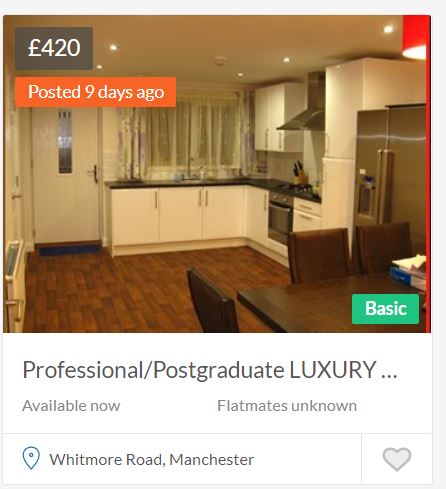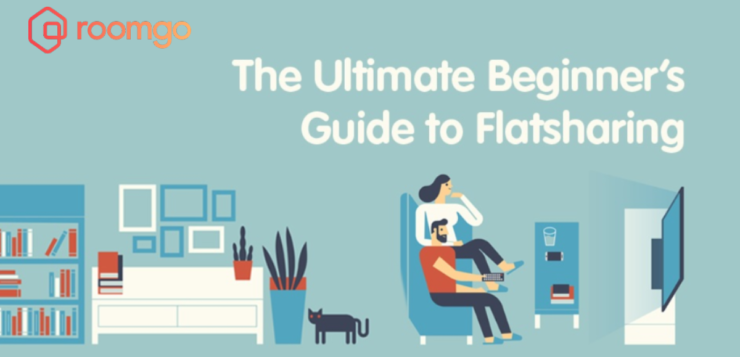Have you ever wondered how so many people move to big cities and still afford to have fun and exciting lives? How they can make new friends quickly without knowing anyone there already? How they can afford to explore everything their new city has to offer? Well, the answer is flatsharing.
Living in a flatshare has become one of the most popular living choices in the UK. And for good reason too, not only can you save money on paying rent but you get all the social benefits of living with other people too. For most people, it’s more than just an affordable accommodation option, it’s a lifestyle choice.
But what exactly is a flatshare and what do I need to know?
Whether you’re looking into flatsharing for the first time or already a well-seasoned sharer, there are many things you need to know before renting a new room. The idea of living with strangers is a daunting prospect to anyone so to help you out we’ve put together a range of useful information in our Ultimate Beginner’s Guide to Flatsharing to get you started.
Contents:
What you should consider before searching for a room?
What are the essential documents you need to have?
What is it like living in a shared flat?
Click any of the above to jump straight to the relevant section.
What is flatsharing?

In a nutshell, a flatshare is when two or more people live in the same property together. Everyone has their own bedroom but the other rooms in the house such as the living room, kitchen, dining room, bathroom etc will be shared. You may also come across the term houseshare which usually refers to sharing a house rather than a flat, however, flatshare is often used for all property types.
Someone who is living in a flatshare is often referred to as a flatmate or housemate. Some people often say roommate but this is generally for people sharing a room, it’s best to double check this if you see advertisements for a roomshare.
Why flatsharing?

Flatsharing allows almost anyone to live comfortably in a good location without paying excessive prices. It’s very common now in most of the UK’s larger cities such as London, Birmingham, Liverpool and Manchester, where the cost of buying or renting a property is considerably more than in other cities.
Essentially, by sharing the extra rooms in a property such as a living room, kitchen etc you’ll be effectively splitting the cost to rent the property, meaning you’ll have more money to enjoy everything your new city has to offer.
The social aspect of flatsharing is another big draw for many people. Moving to a new city, whether it’s to study or for a new job, can be a lonely experience if you don’t already know people living there.
Flatsharing allows you to meet new people, discover new cultures and make new friends. There have been endless tales of people moving in together and becoming friends for life.
What you should consider before searching for a room

OK, so you’ve decided flatsharing is for you.
What’s next? Where do I start?
Flatsharing is a relatively straightforward process but there are a few key things to consider before you start your search:
Who can flatshare?
Flatsharing is available to almost anyone but it’s important to consider who you will be sharing with and how you’ll be able to adapt to living with these people. For example, if you’re a student you’ll probably have a different lifestyle to an older working professional so to avoid any conflicting situations, it’s best to find an all student flatshare.
It’s perfectly normal for people to go through an interview process for a flatshare, this is usually with all the people currently living there. Some flatshares become like family so they want to make sure they’re going to get on with the person they let in.
- Students
Sometimes it can be more cost effective to live in a flatshare rather than student accommodation and many student areas are populated with property designed for sharing.
- Young professionals
A new job can often mean a new city, a new life. Flatsharing with other younger professionals who are in the same position as you is a great way of meeting new people from different walks of life.
- Over 40’s
Flatsharing isn’t just reserved for the younger generation. In fact, statistics now show that the number of flatsharers aged 45-54 has risen by 300% in five years.
- Couples
Just because you’re paired up, doesn’t mean you have to go it alone. Many flatshares welcome couples and it’s a great way to way to hang out with other people as well as just each other.
How much money do I need?

Usually private landlords ask for a month’s rent up front and a deposit, which is normally around the same price as the monthly rent. It may seem a lot to pay upfront but remember that, as long as you look after the property, you’ll get the deposit back and you will already have covered the cost of your last month’s rental payment.
However, if it is an agency listing the property this can change and they may add additional agency fees. It’s always more cost-effective to cut out the middleman and contact the landlord directly to avoid paying extra agency fees.
Though we have a team of experts vetting our site, we can’t vouch for every listing. To avoid being scammed, we advise you to never transfer any money before seeing the property first or meeting with a landlord or representative.
What are the essential documents you need to have?

Before you rent a property, a landlord may ask for a reference check. This is a standard procedure for all landlords to vet who they rent their property out too. It is especially useful in a flatshare as you will have a safe piece of mind that who you are living with has been checked and approved by a landlord first.
According to London landlord Karen Hattersley, tenants should expect to undergo checks from their landlords, who will ask them for references (typically job references as proof of employment or proof of income if a guarantor is paying rent on behalf of the tenant), copies of their ID for a background check and references from previous landlords. Some agencies may also require tenants to undergo a credit check.
Reference checks are fairly quick and easy but you will need to provide a few documents such as:
- I.D
Usually passport, drivers license or identity card.
- Bank statements
This is to check that your salary will cover the rent payments and that previous rent payments have been going in and out. A landlord may also do a credit check. A quality score is not based on the amount of debt you have but more how you manage your repayments.
- Address history
You will usually be asked to provide a minimum of three bills or statements to prove your previous living addresses.
- Proof of employment
You may be asked to provide a scan of your contract to prove that you are in employment or if your a freelancer to provide confirmation that you are working.
- Previous landlord references
A landlord may ask for the details of your previous landlords that way they can check you have been a responsible tenant who looks after the property and pays the bills on time.
The types of flatshares?
When searching for a flatshare, you’ll come across a number of different types of property to live in, here’s a list of some of the most popular:
Flatsharing

This is a property rented out to a group of sharers until one joint tenancy.
Pros
- Splitting the cost of rent.
- A chance to make new friends and learn new cultures.
Cons
- Joint tenants are “jointly and severally liable” meaning that everyone is responsible for rental payments. Even if you have been making your rent payments each month, you’ll still be to blame if someone else isn’t. It can also be tricky when someone wants to leave; in this case, you’ll be responsible for finding a new tenant to replace them.
Student flatshare

A property advertised for students only.
Pros
- Cheaper rent prices.
- Live with people who have a similar lifestyle as you.
Professional flatshare

A property advertised for working professionals only.
Pros
- Live and meet with people who have a similar working lifestyle.
Furnished rental Vs unfurnished rental

A furnished rental is a property where the basic furniture is already provided. This benefits people who don’t already have furniture of their own or are only looking to live in the property temporarily. An unfurnished flat is a property with no furniture, making it ideal for people who want to bring/buy their own furniture or for longer term tenants.
Live in landlord
Where a person owns and lives in a property and rents out one or more rooms. (renters are sometimes referred to as lodgers)
Pros
- Properties are usually of a higher standard and better looked after.
- Quick communication if you have any problems.
Cons
- People often feel uneasy living with the landlord and there is less equal footing than sharing with other renters.
Live out landlord
Where a landlord rents out all the rooms in the property to tenants.
Pros
- You’ll be living with other renters who have their separate agreement with the landlord.
- It’s easier to leave your contract as you have your own agreement with the landlord.
Cons
- The landlord is responsible for picking new tenants sometimes bypassing the approval of other people living in the property.
What you need to budget for in a flashare

It really pays to know the ins and outs of renting a property and to be aware of most landlords’ requirements. Here are a few pointers to consider:
- Rent & Deposit.
- Council Tax.
- Electricity, Water & Gas.
- Household insurance.
- Telephone, internet and insurance.
The prices of these can vary depending on the location you’re looking to rent.
What is it like living in a flatshare?
So, you understand all the practical benefits of living in a flatshare but what is it actually like to live with other people? To give you an idea, we interviewed a handful of people about their flatsharing experience and here’s what they said:
We have over 10,000 rooms listed in the UK on Roomgo so you’re bound to find a new place you can call home. If you haven’t created your free account yet, what you waiting for?







Discussion24 Comments
A flat share is where you share a flat with two or more people with communal living rooms, bathrooms and kitchens but have your own individual bedrooms 😊
A flatshare is when 2 or more people are living in a property together.
A flatshare is half the rent and bills but all the social benefits!
A flatsharw is when two or more people live in a property together!
A flatshare is when two or more people live in the same property together.
When two or more people live in the same property together. Everyone has their own bedroom but the other rooms in the house such as the living room, kitchen, dining room, bathroom etc will be shared.
Flatsharing is when you live in the same house with other people, in different rooms and all of you pay the rent. It is an easy way of sharing the rent and other expenses yet not giving up on living in style- easy, with you, Easyroommate!
When two or more people live in the same property together. Everyone has their own bedroom but the other rooms in the house such as the living room, kitchen, dining room, bathroom etc will be shared.
a flatshare is when two or more people live in the same property together
Flat share – a property (flat, house, houseboat etc) rented out to a group of sharers which makes up one joint tenancy. In a flat share you’ll have your own bedroom but share communal spaces like bathrooms, kitchen, living room and dinning room, garden etc.
Congratulations JAY! 🎉🎉🎉 You have been selected as our winner. Please check your emails for further details on how to collect your prize!
A flat share is where 2 or more people are living in the same property and share kitchens/bathrooms/lounge however have their own individual room.
A flatshare is when two or more people live in the same property together. Everyone has their own bedroom but the other rooms eg. the living room, kitchen, etc are shared.
In a nutshell, a flatshare is when two or more people live in the same property together. Everyone has their own bedroom but the other rooms in the house such as the living room, kitchen, dining room, bathroom etc will be shared.
When more than one share a property
When you share a property with one or more people
A Flatshare is when two or more people are living in a property together.
A flatshare is when two or more people live in the same property together. Great article
When two or more people live in the same property together.
A flat share is a property rented out to a group of sharers which makes up one joint tenancy. In a flat share bath rooms, kitchen, living and dinning rooms are all shared communal spaces. A flat share may also be a house or a houseboat etc
When two or more people live in the same property together.
A flatshare is a property rented out to two of more people. Each person usually has their own bedroom. The kitchen, bathroom and living room are all shared (unless the living room is turned into another bedroom!). Each person signs a tenancy agreement to form one joint tenancy.
Great article, thanks!
Pingback: Finding A Flat To Rent In The City On A Tight Budget - Brit On A Budget